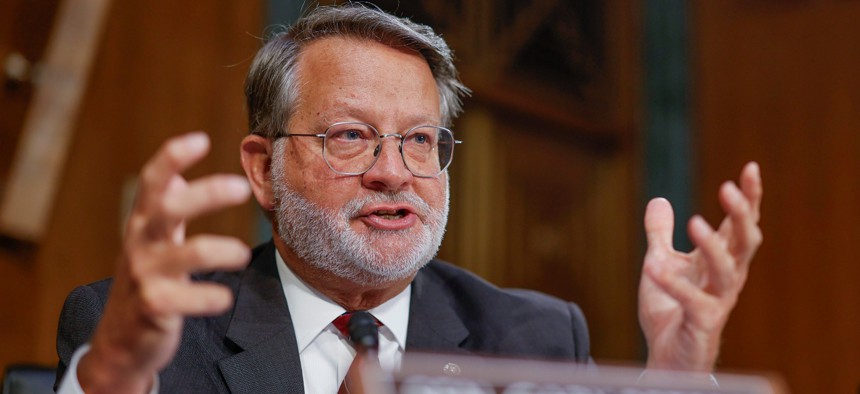Bipartisan Senate bill tasks agencies with prioritizing CX

Sen. Gary Peters, D-Mich., is among a bipartisan group of Senators sponsoring legislation intended to improve federal customer experience. Jemal Countess/Getty Images for JDRF
The pending legislation looks to reduce burdens on users interacting with government while scouting opportunities for cross-agency collaboration.
A Senate bill scheduled for a committee vote next week would require agencies that deliver key public-facing services to step up their game when it comes to wait times, convenience and availability of support across multiple contact channels.
The Improving Government Services Act, sponsored by Sens. Gary Peters, D-Mich., James Lankford, R-Okla., and John Cornyn, R-Texas, puts select agencies on a one-year clock to develop an "annual customer experience plan" designed to increase interagency coordination on service delivery, eliminate "unnecessary" administrative burdens on end users, increase digital channels for self-service options and improve protections for personally identifiable information.
"Taxpayers must be able to easily and efficiently reach federal agencies when they have questions about services or benefits," Peters said in a statement. "My commonsense bipartisan bill would require agencies to adopt customer service best practices that limit wait times and use callbacks to ensure taxpayers receive support in a timely manner."
Under the bill, the head of the Office of Management and Budget is responsible for designating certain agencies as "high-impact service providers." Federal agencies that deliver key services to the public or fund state-based programs will be tagged with the "high-impact" label under the legislation, with loan programs, passport renewal, tax filing, health care, access to public lands including national parks, customs declarations and more named as likely candidates for the high-impact tag.
Agencies that provide these services will be required to submit CX Action Plans that include details on the use of human-centered design, improving the accessibility of forms across multiple languages, information on wait times and backlogs experienced by end users, antifraud tactics and opportunities for cross-agency collaboration.
Many of the goals of the legislation are already contained in governmentwide guidance on implementing the 21st Century Integrated Digital Experience —or IDEA — Act, which was released by OMB last month. The new bill references the IDEA Act's support for expanding digital channels through which customers can connect with federal agencies and programs while also maintaining in-person, telephone, postal mail and other contact options.
“Some agencies have already successfully implemented private-sector best practices, but we need them governmentwide," Lankford said. "Providing good customer service doesn’t have to be difficult. Let’s get this nonpartisan bill to the finish line so interacting with the federal government is less frustrating for the public."
The legislation is scheduled for a markup and vote in the Senate Homeland Security and Government Affairs Committee on Oct. 25.
NEXT STORY: Login.gov to add facial recognition tech






